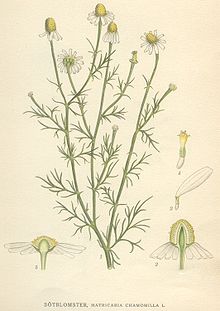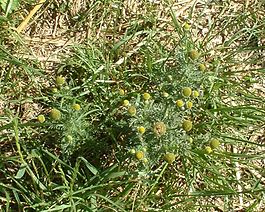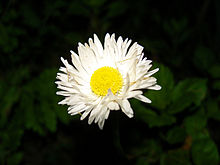- Matricaria
-
Matricaria 
German chamomile
(Matricaria recutita)Scientific classification Kingdom: Plantae (unranked): Angiosperms (unranked): Eudicots (unranked): Asterids Order: Asterales Family: Asteraceae Tribe: Anthemideae Genus: Matricaria
L., 1753Type species Matricaria recutita L. Species Matricaria aurea (Loefl.) Sch. Bip.
Matricaria discoidea DC.
Matricaria recutita L.
See text.Synonyms Chamomilla Gray
Source: ING[1]Matricaria is a genus of flowering plants in the sunflower family (Asteraceae). Some of the species have the common name of "mayweed," but this name also refers to plants not in this genus.
Most are very common in the temperate regions of Europe, Asia, and America, as well as in northern and southern Africa, and some are naturalised in Australia. M. occidentalis is native to North America; other species have been introduced there.
These are hardy, pleasantly aromatic annuals, growing along roadsides in ruderal communities and in fallow land rich in nutrients. Though many are considered nuisance weeds, they are suitable for rock gardens and herb gardens, and as border plants.
Their many-branched stems are prostrate to erect, glabrous, and very leafy. Their bipinnate leaves have numerous linear, narrowly lobed leaflets.
The flowers are radially symmetrical. The greenish-yellow capitula are semi-spherical. The white ray florets can be present (M. recutita) or lacking (M. discoidea). The disc florets are 4- to 5-dentate. The receptacle is 2–3 times as high as wide. The pappus may be crown-shaped and short, or lacking.
Matricaria species are used as food plants by the larvae of some Lepidoptera species (caterpillars) including Lime-speck Pug.
The extract of German chamomile (M. recutita) is taken as a strong tea. It has been used in herbal medicine as a carminative and anti-inflammatory. It is also used in ointments and lotions, and as a mouthwash against infections of mouth and gums. Aromatherapy uses two essential oils of chamomile: the "true chamomile" oil (or German chamomile oil, from M. recutita) and the Roman chamomile oil (from Anthemis nobilis).
The taxonomy of Matricaria is controversial and very confused. Several species are classified either in Tripleurospermum or Matricaria depending on the interpretation of the author. The distinction is made according to the number of the seed ribs: Tripleurospermum has one adaxial and two lateral seed ribs, while Matricaria has four or five adaxial seed ribs.
Contents
Species
- Matricaria acutiloba
- Matricaria albida
- Matricaria arabica
- Matricaria arlgirdensis
- Matricaria aurea (Loefl.) Sch. Bip.
- Matricaria auriculata
- Matricaria brachyglossa
- Matricaria burchellii
- Matricaria capitellata
- Matricaria confusa
- Matricaria coreana
- Matricaria corymbifera
- Matricaria courrantiana DC. -- Crown Mayweed
- Matricaria decipiens
- Matricaria dichotoma
- Matricaria discoidea DC. -- Disc Mayweed, Pineapple Weed, Rounded Chamomile
- Matricaria fuscata
- Matricaria glabra (synonym of Otospermum glabrum (Lag.) Willk.)
- Matricaria glabrata
- Matricaria globifera
- Matricaria grandiflora
- Matricaria hirsutifolia
- Matricaria hirta
- Matricaria hispida
- Matricaria intermedia
- Matricaria lamellata
- Matricaria lasiocarpa
- Matricaria laxa
- Matricaria macrotis
- Matricaria melanophylla
- Matricaria microcephala
- Matricaria nigellifolia
- Matricaria occidentalis Greene—Valley Mayweed
- Matricaria otaviensis
- Matricaria pinnatifida
- Matricaria recutita L. -- German Chamomile, Scented Mayweed, Wild Chamomile, Common Chamomile
- Matricaria raddeana
- Matricaria schinzinna
- Matricaria spathipappus
- Matricaria subglobosa
- Matricaria suffruticosa
- Matricaria tridentata
- Matricaria tzvelevii (synonym of Chamomilla tzvelevii (Pobed.) Rauschert)
See also
References
- ^ "Matricaria". Index Nominum Genericorum. International Association for Plant Taxonomy. 2006-02-20. http://botany.si.edu/ing/INGsearch.cfm?searchword=Matricaria. Retrieved 2008-06-14.
External links
Categories:- Anthemideae
- Asteraceae genera
Wikimedia Foundation. 2010.


